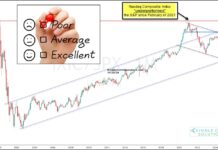One of the great things about investing is the many ways that people approach it. Throughout history it’s been shown that hundreds (if not more) ways have been used to turn a profit within the stock market…. Whether you use fundamentals, technicals, astrology, or hire a monkey to throw a dart.
However, one commonality among those that have risen to the top of our field have had one thing in common: They follow a process. And if you want to join the league of successful investors, you need to follow a process.
The Market Wizard series by Jack Schwager has countless examples of this, with many of the successful investors highlighted in the book echoing each other in their adherence to following a defined discipline.
I came across another great example of this while reading a Bloomberg article on Renaissance Technologies, which likely holds the title for being the best performing hedge fund in history. Ren Tec has produced 40% annual returns (after fees!), compare that to what Warren Buffett who has produced 20% annualized returns and is considered one of the greatest investors of our time. They now only manage employee assets in their Medallion Fund and employ 90+ Ph.Ds with expertise in astrophysics and string theory.
A firm that produces double-digit returns year in and year out would likely elicit some confidence from those within, creating an ethos of investing elitism with magic flowing through their fingers into their trades, right? Nope. They just follow their process. They don’t shoot from the hip. They don’t rely on an instinct to sniff out profits. They don’t override their system because they think they know better. Their trading just before the eye of the 2008 Financial Crisis storm provides a great example of this….
In August 2007, rising mortgage defaults sent several of the largest quant hedge funds, including a $30 billion giant run by Goldman Sachs, into a tailspin. Managers at these firms were forced to cut positions, worsening the carnage. Insiders say the rout cost Medallion almost $1 billion—around one-fifth of the fund—in a matter of days. Renaissance executives, wary that continued chaos would wipe out their own fund, braced to turn down their own risk dial and begin selling positions. They were on the verge of capitulating when the market rebounded; over the remainder of the year, Medallion made up the losses and more, ending 2007 with an 85.9 percent gain. The Renaissance executives had learned an important lesson: Don’t mess with the models.
A firm that employs some of the brightest minds in fields that expand beyond financial markets, having produced returns unmatched by any competitor still had the obedience and humility to trust their process and follow their models. They know they aren’t special. They know magic doesn’t flow from their fingertips. They believe in the scientific method and apply that method to trading and creating models that work.
So what’s it tell you when one of the best, if not the best, investment firm in the world knows they can’t outsmart their investment process or allow their own emotions to take over? It’s the overwhelming importance for the average and professional investor alike to have a system, to have a strategy, to have some kind of method they can rely on when times get tough and chaos flows down Wall Street that can be followed and trusted, leaving emotion at the door.
Thanks for reading.
Twitter: @AndrewThrasher
Any opinions expressed herein are solely those of the author, and do not in any way represent the views or opinions of any other person or entity.








